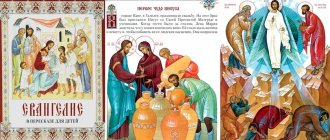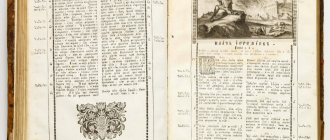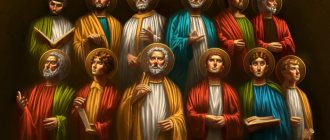For the beginning Christian
Published 11/17/2017
In this short article we will look at some useful tips on how to study the Bible correctly. Perhaps you have already read the Bible on your own and would like to learn to understand it better. Why study the Bible on your own? So that you are not deceived by other people (even unconsciously). So that you personally become acquainted with the lives of biblical heroes. And that you might personally come to know Jesus Christ and what He taught. Let's start.
Where to begin?
If you are just beginning to get acquainted with the Bible and have the Restoration Translation of the New Testament with Footnotes, we recommend that you first read the two short articles located at the end of this edition: “The Meaning of Human Life” and “The Bible is a Treasure House.” This will help you get a general understanding of what the Bible is and what this Book says.
After this, read one of the four Gospels with which the New Testament begins. The first Gospel, the Gospel of Matthew, tells about Jesus Christ, who is the Savior-King who came to call sinners to the kingdom of heaven. The second Gospel, the Gospel of Mark, is the shortest; it shows Jesus Christ as the Slave Savior who came to serve God and people. The Gospel of Luke presents us with a Man-Savior living a proper and normal human life. In the Gospel of John we see Jesus Christ as the Savior-God coming as life to man.
See the article Where to start reading?
Holy Scripture among other church books
It is in the Holy Scriptures that we find the clearest and most accurate presentation of saving truths. Anyone who wants to enter the Kingdom of Heaven must first of all turn to the Holy Scriptures and, from other books, choose the Word of God as his main companion and guide. The Gospel teaching is addressed to all people without exception and is easily achievable for everyone.
Next in terms of teaching dignity are the patristic works. They should be read only in accordance with the chosen way of life (monks - instructions to monks, laymen - the Holy Fathers who delivered their teachings for all of Christianity) - so that what you read can be applied in life; otherwise, fruitless daydreaming is born in the soul, confusion in the heart, and uncertainty in behavior, which is painful and harmful for the reader and his neighbors.
Books of a moral order are very useful - about the fight against passions and ways to acquire virtue - that is, about practical life in Christ.
Contemporary church literature cannot be equated in importance with the teachings of the Holy Fathers, and especially with the Holy Scriptures, since it has not yet been received (accepted) by the conciliar mind of the Church. Among these, you can only read books that have a church blessing and serve to please God.
Without the need and special blessing of a confessor, one should not read polemical books, since they generate unnecessary disputes (2 Tim. 2:14-18), are often written in a fit of passion and carry condemnation that is not befitting a Christian (Matt. 7:1 ). In relation to controversial issues, Orthodox Christians should be guided not by polemical books, often of dubious content, but by the opinion of the clergy, expressed in official church documents.
Secular literature should be approached even more strictly and with greater caution.
How to read the Bible?
Challenge yourself to read the four Gospels first and then the entire New Testament. At this point, you can read the New Testament without the footnotes, referring to them as needed to understand a particular passage. If you spend ten minutes a day reading the New Testament (without notes), you will read it in 12 weeks, or about three months. Check out our short articles How to Read the Bible, Reading Schedule, and One Hundred Verses a Day.
From the links below you can download the reading schedule “One Hundred Poems a Day” (PDF file in A4 format):
- New Testament reading schedule (1 page);
- Old Testament reading schedule (3 pages);
- Reading Schedule for the Whole Bible (3 pages).
You can read either the printed edition of the Restoration Translation or the online version. If you don't have a printed copy, order one from us free of charge.
Begin to understand the essence of the teachings of Jesus Christ
In response, Jesus said to them: “What I teach does not come from Me, but from Him who sent Me. If a person wants to do what is pleasing to God, then he will find out from whom this teaching is: from God or from Me Myself. He who speaks from himself worries only about his own glory, but he who tries to bring glory to the One who sent him is sincere, and there is no untruth in him. (John 7:16-18)
Once you have read all four Gospels, you can begin to move on to the next level. Start to get to the heart of what Jesus Christ taught. The life of Jesus Christ and His coming to earth had a special meaning and purpose. You need to start reading the Gospels again, but now with the goal of understanding the essence of the teaching. Record your observations. The Bible is not just a collection of interesting stories. The Bible is God's message to man. The New Covenant is God's new agreement with every person on earth, including you! The task of the Bible student is to understand the purpose and meaning of this agreement.
How to study the Bible?
After or along with the overview reading, it may be helpful to delve deeper into the contents of the New Testament using the footnotes of the Recovery Version. We consider them to be the best help in properly understanding the Bible. Footnotes can be used in several ways:
- Read all notes as you read the New Testament sequentially.
- Review the notes for those verses whose meaning you want to understand more deeply.
- Use the notes in our Ten Day Bible Study Plan to review the Bible.
- Explore notes on a specific topic using our Subject Index.
Inspiration of Holy Scripture
The exceptional position that Holy Scripture occupies is explained by the fact that it is an inspired book.
There have been different understandings of the sense in which Holy Scripture is inspired by God. Some thought that everything in it, from the first to the last line, was dictated by God, and therefore it could not contain errors. This is not entirely true, at least in light of Gal.3:15. Inspiration was also understood as an incentive to write, regardless of the content. The Orthodox approach implies that Revelation recognizes in the Bible what God wanted to reveal about Himself and His relationship to the world to people: the Word of God teaches us not how heaven works, but how to ascend to heaven. These saving truths are made available to us through the free cooperation of God and the sacred authors in the writing of the Bible.
This understanding of inspiration allows us to distinguish in the Holy Scriptures what is established for all times (the teaching of faith and the rules of morality), and what is established for a specific situation (moments determined by national characteristics, geography and the level of historical development).
Levels of perception of the biblical text
So, we have seen that the text of Holy Scripture can be read and interpreted in different ways.
Superficial reading, which only allows you to follow the storyline, is by no means sufficient. In each passage one should try to see the problem, consider what solution it receives here and also in the wider context of the Bible - one should reflect on the problem. It is also important that what we perceive does not remain a dry sum of knowledge, that our reading rises above the intellect, and that the truths of faith touch our heart.
Finally, the most important thing: what is sown in our hearts must bear fruit; all that remains is to put into practice what has been revealed to us.
Limitations of Interpretation
Even when all the rules of interpretation are followed, some issues remain not entirely clear. This shouldn't bother us. Humility before the mysteries of God is better than fruitless attempts to come with our minds to what we have not yet matured to. This is the position of both patristic theology and serious researchers of our time.
It should be remembered that the basic truths needed for salvation are simple and require not intellectual comprehension, but implementation.
However, we should not be embarrassed by the fact that something is withheld from our understanding for the time being - at the right moment the Holy Spirit will definitely remind us of what we have read. It is an “investment” that will bring benefits in due time.
Help comments
Do we meet the above requirements? Obviously not, not completely. And therefore we need help, which we can get from people more experienced in spiritual life, from those whom the Church calls saints. Remaining open to the direct action of the Spirit of God in us, we must be guided precisely by their understanding of the Holy Scriptures, because, according to the testimony of the Church, the Holy Spirit speaks through them.
A person who has just come to faith must first study the Orthodox church tradition, therefore, comments from other faiths are not useful for everyone; only spiritually experienced people can use them, separating truth from error; In general, when choosing literature at first, it is good to be guided by the advice of your confessor.
The relativity of scientific knowledge forces us to treat modern biblical scientific research and translations with caution. Unfortunately, not all scientists are believers.
Some technical points of reading the Word of God
The Holy Scriptures should be read in small passages, with prayer and meditation. However, for those who have succeeded in this, the Holy Fathers also approve the practice of reading whole books. Reading should be regular and systematic (sequential), taking place at a specially designated time. One should study the Word of God constantly, and no place can serve as an obstacle to this (Deut. 6:6-9). However, it is very important to maintain silence - first of all, internal silence - because the voice of God is like the breath of a quiet wind (1 Kings 19:12). It is useful to memorize the Word of God, especially passages from the Gospel and Psalms.
Often, when reading a text, we understand it differently than the author understood it. This is due to individual moments of our perception, historical and cultural traditions. When reading any text, we seem to give it our own interpretation (even without going into details). The same thing happens during the translation process. Therefore, it is important to use various historical and philological commentaries and dictionaries, various translations, especially those consecrated by church tradition. However, you should not attach paramount importance to these points - you can get bogged down in the details of the analysis and never reach the meaning.
It is important to notice all the details of the story, be it a word of teaching or some action. Every letter of Holy Scripture has a teaching to offer to those who treat the Word of God with reverent attention.
And in another sense, we should treat the Word of God with care: we cannot read from it what we would like to hear, silencing the rest (often for self-justification). This is incorrect from the point of view of Christian morality, and from the point of view of methodology: the Bible is not a collection of heterogeneous verses, each of which is self-sufficient, but an integral work, and therefore a certain place can be correctly understood only in the context of the entire Scripture (the so-called “broad context").
Almost always, clarifying the meaning of a text also requires reference to the immediate context, so it is useful to at least review the previous and subsequent narratives of the book you are reading.
One of the surest ways to read the Holy Scriptures is in connection with the lives of the saints. By imitating the exploits of the saints to the best of our ability, we will gradually grow in our understanding of the Word of God.
Purpose of reading
It is known from general linguistics that in the process of communication a person not only transmits information, but also expresses his emotional state and encourages action. This is also true of the Word of God. It not only conveys to us some knowledge, but also speaks about the emotional state of the sacred authors and calls us to something. It is very important to hear the call.
The purpose of reading the Bible is to meet God and the real person. When reading the Holy Scripture, we must try to see in it the ideal to which we must strive, and this ideal is our Lord Jesus Christ Himself. It is no coincidence that the Holy Fathers, reading the Old Testament, saw in it hidden narratives about Christ (which was called “reading in a Christological key”).
When reading the Holy Scriptures together, our brothers and sisters also open up somewhat differently than what happens in ordinary life, because the Word of God requires an openness of heart. And if we are attentive, we will see the grace that is inherent in every believer, and we will be able to rejoice and give thanks. We can also see inner damage and vulnerability, and this will teach us to be more kind to our neighbors. Reading the Scriptures together is one of the best ways to enter into brotherly relationships in God.
The Bible and life in the Church
Until now, we have considered the Holy Scriptures in isolation, but we must clearly understand that the Holy Scriptures are one of the components of the Holy Tradition of the Church: “I would not have believed the Scriptures,” says Blessed Augustine, “if the authority of the Catholic Church had not prompted me to do so.” For Orthodox believers, the source of faith is the divine service, the patristic heritage, and, of course, the living bearers of the Orthodox Christian faith, their experience of walking in God. The monastic tradition constantly emphasizes that living example is the best means for growing in perfection. This is fully consistent with the Holy Scripture, which says: “Faith therefore comes by hearing, and hearing by the word of God” (Rom. 10:17; by “hearing” one can generally understand experiential learning). However, it is Holy Scripture that verifies the compliance of this or that material with the Tradition of the Church.
While paying due attention to the Holy Scriptures, we should not forget that the teaching of faith is only one of the four components of the life of the Church, along with the communication of believers among themselves, Communion and prayer (Acts 2:42).
The Path of Studying the Word of God
The patristic tradition of reading the Holy Scriptures suggests that we read the Word of God in order to meet our Lord Jesus Christ himself. But this is impossible if we treat the Word of God superficially, reading only to read a certain amount of text without reflecting on it. However, excessive thinking and rationality sometimes threaten to become self-sufficient, and intellectual work can replace living communication with God. Instead of soul-searching for the purpose of self-correction, the Fathers invite us to turn with fervent prayer to the One who alone can correct our heart: “Knock, and it will be opened to you” (Matthew 7:7). When the meeting occurs, reason is no longer needed, even the words of prayer are no longer needed, for we have received what we were striving for - we have entered into the Presence of the Lord, where only He can speak. This tradition is called lectio divina.
In the era of scholasticism, the lectio cursiva method came into use, in which reading becomes more intellectual: questions are posed, solutions are proposed, which must be justified by authoritative texts. Such reading is good for learning, but can give little to spiritual life.
Individual, group and liturgical reading of Holy Scripture.
Different forms of reading the Holy Scriptures have their own characteristics that must be taken into account.
Solitary reading at home encourages reflection and prayer (the lectio divina method is mainly used).
The study of the Holy Scriptures in Bible groups is intended to teach the correct reading of the Holy Scriptures and to reveal the full range of meanings inherent in the text so that each participant can derive some kind of edification for himself (partially the lectio cursiva method is used).
When writing commentaries, special forms of working with the original text are used; the lectio cursiva method is predominantly used.
The reading of the Holy Scriptures during worship and the sermon that follows should serve to build the community: here the pastor must correctly teach the teachings of the Church and call for changes in the life of each parishioner and the community as a whole (the use of one or another method, their combination depends directly on the preacher).
History of Church Interpretation of Holy Scripture
Let us dwell in some detail on the methods of interpretation of Holy Scripture.
The difference in interpretation of the Holy Scriptures can be so wide that the Jewish tradition says that the Torah has seventy faces, i.e. seventy levels of meaning, according to the number of peoples of the earth. We will not be able to give the only true meaning, and the search for such will inevitably lead to heresy (however, we should cut off what contradicts the dogmas of the Church).
It is the inexhaustible depth of the meanings of Holy Scripture that determined that in the history of the Church there were different methods and even schools of interpretation of the Word of God.
Of course, the easiest way is to see only the literal meaning in the biblical text. This is how one can read the historical books of the Old Testament, this is how one should read the historical narratives in the Gospels and the book of Acts.
However, if you approach, for example, the Song of Songs this way, you can become confused. Allegory comes to the rescue. In this book, the Groom will be understood as God, and the Bride will be understood as the Church or the human soul. This method, Jewish in origin, is used by Saints Cyril of Alexandria, Gregory of Nyssa and others.
A new understanding of the Scriptures came in the time of the Savior. The peculiarity of our Lord’s interpretations was that He knew how to highlight the essential and taught to be guided not by rules in the application of biblical moral standards, but by the spirit of love. Our Lord explained (interpreted) the Holy Scriptures with his life (John 1:18). It is the experience of a righteous life in Christ that best helps us understand the meaning of Scripture.
For the first Christians, it was important to find prophecies that would support our hope and faith, prophecies not only in words, but also in situations. Thus, the Jewish Passover anticipates the Christian Passover, manna - the Eucharist, in the story of Adam, Joseph, Isaac or Moses we see prototypes of Christ, etc. This method was called theory and was very popular among interpreters.
Of course, the desire for righteousness, purification and elevation of the soul also found its manifestation. Moral interpretations appear, the model for which will always remain the works of the ascetic fathers.
Finally, with the flowering of monastic mysticism, interpretations appear that reveal deep things about God, the Kingdom of God in the texts (St. Maximus the Confessor). This method is called anagogy.
However, as St. Gregory of Nyssa notes, there is no point in arguing about the names of the methods; you may not even know them; it is more important to “stick to useful understandings,” that is, to understand the Holy Scriptures in such a way that it benefits the soul. It is also important to note that patristic interpretations were never arbitrary fantasies on the topic of a biblical passage, but harmoniously combined the literal and spiritual meaning; and it could not be otherwise, because real interpretations are not rational reflections, but what is revealed in reading with prayer, to the extent of following the commandments of Christ.
Truth in Scripture
The rules of faith and norms of moral life are recognized as truth in the Holy Scriptures. Events in the church-political life of the people, and historical facts in general, are significant insofar as they are significant for the history of our salvation.
Often, unbelievers look for historical contradictions in the Holy Scriptures. It is appropriate to ask yourself: is it worth entering into a debate with them, because the Apostle Paul warned that “evil people will abound in evil, deceiving and being deceived” (2 Tim. 3:13). For yourself, it is good to read one of the popular introductions to the Holy Scriptures to see: the history of biblical studies of the twentieth century has clearly demonstrated that what the critical science of the nineteenth century considered to be fiction and historical fake has been confirmed.
Scientists believe that the modern picture of the world is quite comparable with the biblical one; The main events of sacred history are increasingly being confirmed. Only unscrupulous science today can insist that Holy Scripture is fiction and myth.
Prayer and reading
In general, Holy Scripture is not just literature. The Holy Fathers, church pastors and ordinary believers all unanimously testify that by reading the Holy Scriptures, we can meet the Lord and know His good will for us; some sacred writers (for example, Blessed Jerome) consider the reading of Holy Scripture as a sacrament, on a par with the Eucharist.
The Bible becomes the Word of God, which can enlighten, heal and show the way to eternal life only when there is a personal meeting with God. This often happens in prayer - public and private.
Even in Old Testament times, before reading the Torah (the Pentateuch of Moses), special blessings were read: 1) to actually fulfill the commandment of studying the Law of God; 2) asking that the study of the Scriptures be pleasant and desirable; 3) with gratitude for being chosen as God’s inheritance and the gift of the Torah.
Today, Orthodox Christians have special canonical prayers that are read before studying the Holy Scriptures and which contain a truly holistic teaching about reading the Word of God, for example:
“Lord Jesus Christ, open the eyes of my heart, so that, having heard Your Word, I understand It and fulfill Your will. Hide not Your commandments from me, but open my eyes, that I may understand the wonders of Your law. Tell me the unknown and secret of Your wisdom! I trust in You, my God, and I believe that You will enlighten my mind and meaning with the light of Your mind, and that then I will not only read what is written, but also fulfill it. Make it so that I do not read the lives of the saints and read Your Word as a sin, but for renewal and enlightenment, and for holiness, and for the salvation of the soul, and for the inheritance of eternal life. For You, Lord, are the illumination of those who lie in darkness, and from You is every good gift and every perfect gift.”
It is necessary to pray not only before starting, but also during the process of reading the Holy Scriptures. According to the figurative expression of one experienced presenter, the Word of God sounded before the creation of the world and continues to sound. The purpose of our prayer before reading is to enter into a state of listening, to tune in to this sound, to this wave: “Speak, Lord, for your servant hears” (1 Samuel 3:10). And the result of reading should also be expressed primarily in prayer. At the same time, just a collection of prayer texts is not enough, for reading the Holy Scriptures must find a personal response in the soul of every believer.
Reading conditions
The first condition is love for God and neighbor. Without faith and love for God, the Bible will remain a “closed book,” but you cannot approach God with something in your heart against your neighbor.
Hence, purity of soul is the second requirement for those who pick up the Word of God: a person who wants to understand the Holy Scriptures must engage not so much in reading interpretations as in cleansing the heart from carnal vices. Those whose spiritual eyes are healthy do not need the help of interpreters, since the Holy Spirit dwells in a pure person (1 Cor. 6:19), enlightening a person in the Word of God (2 Tim. 3:16).
It is necessary to understand that the main interpreter of Holy Scripture must be the Holy Spirit (John 16:13). It is the Holy Spirit, through the Holy Scriptures, who can show us to ourselves in the true light and motivate us to repentance, cleanse our souls from sinful thoughts and give us peace, tranquility and joy in the Lord.
Finally, humility, contrition of spirit and readiness to hear and do the will of the Lord without grumbling, no matter how difficult it may seem - this is the fourth condition for those who begin to read the Gospel (Is. 66:2). Not everything will work out right away, but the one who keeps the word of God in a good and pure heart and follows it patiently will certainly bear fruit (Luke 8:15).










